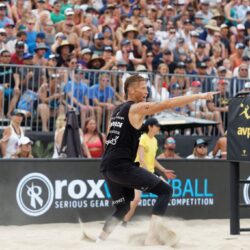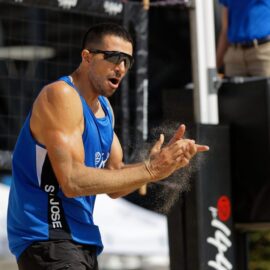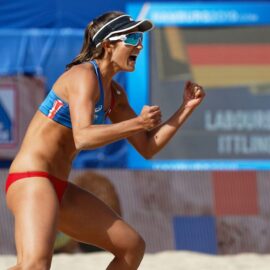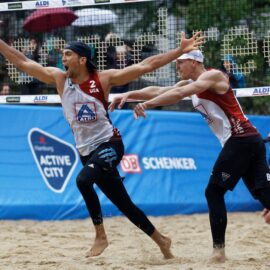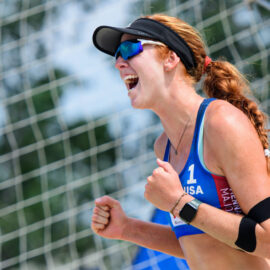Hometown: Newbury Park, Calif.
College: BYU
Accolades:
- 2009 AVP Coney Island Champion
- 2011 NVL Aspen Champion
- 2012 NVL Baltimore Champion
- 2012 Jose Cuervo Belmar Champion
- 2012 Jose Cuervo Chicago Champion
- 2013 AVP Cincinnati Champion
- 2013 AVP Atlantic City Champion
- 2013 AVP St. Petersburg Champion
- 2013 AVP Santa Barbara Champion
- 2013 FIVB gold medal — Shanghai, China
- 2013 FIVB silver medal — Corrientes, Argentina
- 2013 FIVB bronze medal — Gstaad, Switzerland
- 2013 USA Volleyball Team of the Year with Jake Gibb
- 2013 AVP Best Offensive Player
- 2013 AVP Team of the Year with Jake Gibb
- 2014 AVP Salt Lake City Champion
- 2014 AVP Cincinnati Champion
- 2014 AVP Atlantic City Champion
- 2014 AVP Huntington Beach Champion
- 2014 FIVB bronze medal — Stare Jablonki, Poland
- 2014 AVP Team of the Year with Jake Gibb
- 2015 AVP New Orleans Champion
- 2015 AVP New York City Champion
- 2015 FIVB gold medal — St. Petersburg, Fla.
- 2015 FIVB silver medal — Olsztyn, Poland
- 2016 AVP Huntington Beach Champion
- 2016 AVP San Francisco Champion
- 2016 AVP Manhattan Beach Open Champion
- 2016 Olympian
- 2016 AVP Team of the Year with Jake Gibb
- 2018 FIVB bronze medal — Tokyo, Japan
- 2019 AVP Hermosa Beach Champion

Casey Patterson celebrates with Chase Budinger. Photo FIVB
Casey Patterson’s story
Casey Patterson didn’t have much of a clue what had just happened. For nine days, he did many things people would love to do in their lifetime, save for one: sleep. He spent a week in Sweden, running a tournament with Hans Stolfus. They won and, by extension, won the entire tour championship.
Pouring rain the entire time. Airplane. Sleepless red eye. California. Hospital. His wife, Lexi, is having a baby. Name’s Cash.
See ya, Lexi!
Off to New York.
Another plane. Third time zone. A wink of sleep.
He and Ty Loomis are winning. Winning more. Then a loss — to the contender’s bracket they go. A longer road. But it’s working. They’re beating Matt Olson and Kevin Wong, Anthony Medel and Patterson’s buddy, Stolfus. Then they take down John Mayer and Jeff Nygaard.
We’re in the finals!
We’re in the finals?
A phone call to Lexi. Hasn’t slept either. Newborns, you know?
“I’m in the finals!” Casey yells to his wife — and if you had seen Patterson play during New York, you’ll know that yelling is exactly what he did.
“Wait,” she says, “you’re not coming home?”
Should he come home?
“Gnarly,” he recalled of that conversation.
But he couldn’t come home. Not now. Not after the journey he had been through. There were still people out there he needed to prove wrong. He’d do it, too. The next day, he and Loomis won their first AVP title, stunning John Hyden and Sean Scott, making it a clean sweep of the top four seeds in the tournament in four straight matches.
In nine days, Casey Patterson had won the Swedish Tour, had his first of four children, and won his first AVP tournament. It’s possible he won more titles in that week and a half than he had hours of sleep.
“I was like ‘What just happened?’” Patterson recalled on SANDCAST: Beach volleyball with Tri Bourne and Travis Mewhirter. “The last nine days were such a blur, because you’re still in jet lag, you have a kid, then you don’t sleep at all, you go straight to playing. That’s when the scoops of pre-workout started, because I’m like ‘Dude, I can’t even keep my eyes open and if I drink too much water then I feel sick, so I just gotta go straight to the mouth.’ That’s where the scoops started. It’s been a dream ever since.”
Patterson is nothing if not all in. He’s always been that way, far before his Sweden-newborn-New York-AVP win blur of a life-changing week and a half. When he began taking beach volleyball seriously, during an off-year at BYU, he didn’t dip his toes in. He up and moved to Hawai’i, with 42 bucks and a skateboard to his name. He lived on the floor, did yard work in the morning, helped build a guest house, then the rest of the day was his. The garage had a gym, so he’d lift, do his yard work, then go play with the aunties at DeRussy, Queen’s Beach on the weekend, the North Shore with the lifeguards. Wherever there were games, he’d find them, skating wherever there was a beach and a ball.
One weekend, he won a King of the Beach, splitting two grand.
“I lived off that and ate rice,” he said, laughing. “That was the year BYU won the national championship. I was like ‘Sweet, of course, the year I leave. I would have at least rode the bench and taken it.’ It was weird. Beach just gradually told me I needed to do that.”
Indoor became the avenue through which his beach career was funded. He’d play in Puerto Rico and Sweden, beginning in 2005, then return to the States to play beach during the summers. It was slow. A main draw here. A pair of ninths there.
Then came New York in 2009, a season in which his prize money ballooned from just over $10,000 to nearly $50,000. Suddenly Patterson was a father, a bona fide professional beach volleyball player, an enormous personality in a sport deprived of them, one the TV cameras always found. He was an AVP champion.
And then the AVP went bankrupt.
Dozens of players considered, and did, retire. But the beach had called, and Patterson had answered. He’d make this work.
He went overseas with Brad Keenan to get his first real taste of the FIVB, scooped up a full deck of wild cards with Koichi Nishimura on the Japanese Tour, supplemented with another contract in Puerto Rico.
“I was just a gypsy, doing whatever I could do to keep playing volleyball,” Patterson said. “I know this is what I should be doing, I gotta make it happen. I was for sure a journeyman, I’m just going to put the bag on and fine someone who wants to play. That’s all I did.
“You just become this ultimate utility man. Social media? I can do that. Photographer? I could do that. Coach a clinic on the other side of the world and come back and play? Sure. It’s a constant world of stress and what-ifs and your wife is wondering what’s going to happen, are you ever going to provide for me consistently, are we ever going to go on vacation? But you become resilient, and you learn how to make things happen and you learn how to network so well that it’s become a valuable thing for me to reach out when there is no volleyball or when there is. You become this well-rounded human that you’re like ‘If I own a company, I want to hire those guys, because they survive off of nothing for so long and almost create this professional label out of thin air.’”
When the AVP returned, Patterson’s gypsy years paid off. He had made the switch to defense, winning an NVL at the Preakness with newcomer Ryan Doherty. The dream was to have Phil Dalhausser call him, offer to make an Olympic run. it was Phil, after all, whom Patterson had beat in the finals in Baltimore. Patterson didn’t get that call, but he did get the next best thing: Jake Gibb was on the other end of the phone.
Let’s make a push for Rio.
Gibb had just finished ranked No. 1 in the world with Sean Rosenthal. It was the break Patterson had been seeking since he was relegated to the bench at BYU. It would take only two tournaments to prove he was every bit deserving of it. A win in Shanghai preceded a silver in Argentina, where they’d beat a brutal gauntlet of Brazilians Alison and Emanuel, Alvaro and Ricardo, and Italians Daniele Lupo and Paolo Nicolai.
“I’m going to come in loud and hot and aggressive and you’re going to love to play with me and you’re probably going to hate to play against me, but when I do get you on my team, we’re going to be best friends forever, and that’s how I always work,” Patterson said. “I always thought you gotta be all in, band of brothers, let’s go. That was always my theory on how to play.
“Jake 100 percent just charged me up and let me go. He just said ‘Just be you dude.’ Tyler [Hildebrand] would always say ‘Look, Case, if you’re not going full Hulk, and you’re quiet sometimes, and you’re not being you, those are the matches we lose. You’re trying to be a Todd Rogers and being quiet and all cerebral. That’s not your game. That’s not your world. You don’t thrive. You thrive in talking to the crowd and listening to what they’re saying. If they’re talking trash, you’re talking back to them and trying to get them back on your team. You gotta be full Hulk, you gotta go all in, because that’s when you make things happen.’”
Things happened, all right. Thirteen AVP wins in four years, six FIVB medals, AVP’s team of the year in 2013, 2014, and 2016.
“That justified Jake’s decision and it justified my decision to go all in and not go coach 15 teams to make up financially,” Patterson said. “All I did was play volleyball and that was it. That was the only opportunity I’ve had where the only thing I did was play volleyball.”
It’s a new phase he’s in now. Volleyball is no longer all Patterson does. After the 2016 Olympics, in which he and Gibb finished 19th, Patterson moved to Thousand Oaks, about an hour drive from Hermosa Beach and at least two from Huntington, where he and Gibb trained. Gibb partnered with Taylor Crabb, Patterson took up a more mentor-type role.
He scooped talented up-and-comers in the USA Volleyball pipeline: Theo Brunner, Stafford Slick, Chase Budinger. He’s continued to enjoy success in abundance, making three finals in 2019 alone, and “I’m still competitive,” he said, “but I just don’t take it personal, and I’m not so angry all the time. I’m learning and I’m able to have conversations with people I didn’t like playing at all.
“After Jake was done I had a choice, it was either ‘I’m going to try to stay in the main draw or develop guys that USA is putting time into and hopefully give them some experiences and chances to be in tournaments and win.’”
All of his succeeding partners have done just that. Slick took his best finish at a major this past year with Billy Allen, a ninth at the World Championships, where they upset Brazil’s Evandro and Bruno. In 2019, with Reid Priddy, Brunner won his first silver medal, his highest finish on the FIVB. After a year with Budinger, in which they finished with more points than any other team on the AVP, Budinger was picked up for a long-term partnership with Chaim Schalk in which the 2024 Olympics are the goal.
“Normally I probably would have been really upset with that,” Patterson said. “But I was just like ‘Dude I want you to be as successful as possible, I can’t tell you what to do. I hope you do really well and you’re successful and this is the right choice for you. I want you to be successful and if that isn’t with me, then I don’t want someone pity playing with me.’ I just want to be ‘Hey dude, go for it, go win as many events as possible.’”
No matter his role — partner, mentor, father, husband, coach, beach volleyball player, sponsored athlete — Patterson has never known anything but all in. He’s enjoying this final chapter, a supportive one. When John Hyden, perhaps his biggest rival throughout his career, asked Patterson to post about Hyden’s new facility in Tennessee, Patterson didn’t think twice.
“Hyden and I collectively hated losing to each other more than anyone else,” Patterson said, laughing. “He hated playing against me because I was loud and annoying and I hated playing against him because of his style and what he would say and talking to the refs and whining about calls and me whining back. And now he sent me a thing about his club for me to post and I’m like ‘Yeah dude I’d love to post that for you and help you promote your club!’ I wish I had that mentality my whole career instead of just the last few years.”
It’s peaceful, this new mindset. And Patterson is, as always, all in on it.


